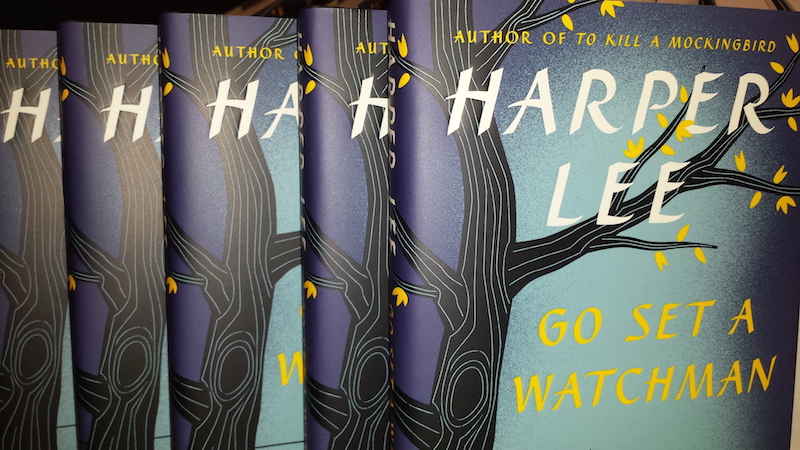Go Set a Watchman
Jayne English
 Brilliant Books in Michigan has offered refunds to its customers who bought Harper Lee’s Go Set A Watchman. More than offering refunds, they condemned its publication. The publication of Lee’s book has raised a tempest of criticism and debate. I hesitated before buying it due to a mix of guilt—given the controversy regarding whether the now-elderly Lee was behind publishing it—and a desire to not have my recent reading of To Kill A Mockingbird marred by whatever it was in Watchman that was troubling the waters of the review world.
Brilliant Books in Michigan has offered refunds to its customers who bought Harper Lee’s Go Set A Watchman. More than offering refunds, they condemned its publication. The publication of Lee’s book has raised a tempest of criticism and debate. I hesitated before buying it due to a mix of guilt—given the controversy regarding whether the now-elderly Lee was behind publishing it—and a desire to not have my recent reading of To Kill A Mockingbird marred by whatever it was in Watchman that was troubling the waters of the review world.
Brilliant Books has a point about it being hyped as a new novel by Lee. It’s a draft of Mockingbird. Brilliant is refunding money to those who feel they were duped by HarperCollins’ marketing strategy. Rather than expecting it to be a new novel, Brilliant suggests readers approach Watchman from the perspective of “academic insight.” And they’re right. We have to remember it’s a draft that becomes Mockingbird through the editorial process. One review asks, “How is it possible that [Atticus] this paragon of morality and virtue and a beacon of racial justice could undergo such transformation in 20 years?” But that’s the wrong question since Watchman is not a sequel to Mockingbird or a separate book. The right question is what revisions did Watchman’s Atticus undergo to become the Atticus of Mockingbird?
The key to knowing that Watchman is a draft is found in the title. “Go set a watchman” is taken from a passage in Isaiah that says, “For thus the Lord said to me: ‘Go, set a watchman; let him announce what he sees.’” A thoughtful writer is particular about the title she chooses, and Lee changed the title between the draft and the book because Atticus was changing.
In Watchman, Lee was, as the verse in Isaiah implies, announcing what she saw. Through this Atticus, she shows us the South’s struggle to grant God-given equality to all people. Through both Watchman and its reviews, we’re provided a look into this country’s history of racial problems. My reading led to articles on Southern Agrarianism; Supreme Court rulings like Plessy v. Ferguson and Brown v. Board of Education; the Tenth, Thirteenth, and Fourteenth Amendments. In Watchman, Atticus was trying to work through racial issues from a skewed perspective. In Watchman, Atticus is now notorious for comments like: “Do you want Negroes by the carload in our schools and churches and theaters? Do you want them in our world?” A reviewer puts it this way, “So the idea that Atticus, in this book, ‘becomes’ the bigot he was not in ‘Mockingbird’ entirely misses Harper Lee’s point—that this is exactly the kind of bigot that Atticus has been all along.” But the reviewer’s assessment, in its turn, entirely misses the point of reading the draft. This is the Atticus who Lee (our watchman) saw and announced to us in Watchman—a usually well meaning, educated man of the South, shot through with prejudice.
Lee spent over two-and-a-half years in countless discussions with her editor, Tay Hohoff. A history of Lippincott, Mockingbird’s original publisher, quotes Hohoff: “When she disagreed with a suggestion, we talked it out, sometimes for hours. And sometimes she came around to my way of thinking, sometimes I to hers, sometimes the discussion would open up an entirely new line of country.” It’s because of their conversations that I believe Lee and Hohoff would both be thrilled to know the endless discussions and reviews the release of the draft has generated. (And accomplishes the complete opposite of disrespecting Hohoff’s role as her granddaughter suspects.) What could be closer to the heart of a writer and editor than having their work once again influence discussions about something as important as race relations?
Through the long talks and revisions, Lee’s focus changed. She changed the title of the book because of it. She began to develop a completely empathetic and humble Atticus (“You never really understand a person until you consider things from his point of view - until you climb into his skin and walk around in it."). Atticus became the character who fought for everyone’s rights, who respected everyone: his children, his housekeeper, poor whites who couldn’t pay him, a black man wrongly accused (and the ignorant white man who accused him), and a reclusive, marginalized white man.
Another thing I returned to in my support reading was this, something that even the men who penned it weren’t able to implement: “We hold these truths to be self-evident, that all men are created equal, that they are endowed by their Creator with certain unalienable Rights, that among these are Life, Liberty and the pursuit of Happiness.” Isn’t the Mockingbird Atticus the incarnation of this highest ideal? This is the best part about reading Watchman without guilt, without disappointment, without it tainting Mockingbird. Lee’s development of a wise, just Atticus, raised Watchman from a story, to Mockingbird, a classic. By the time Lee got through crafting her story she was no longer the watchman telling us what she saw. She was telling us what she hoped to see.